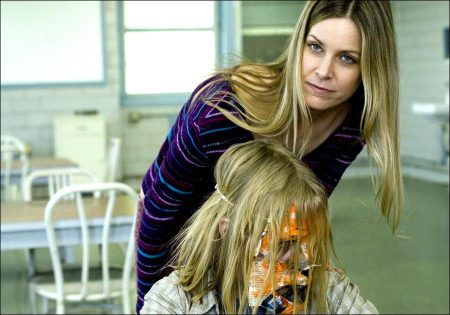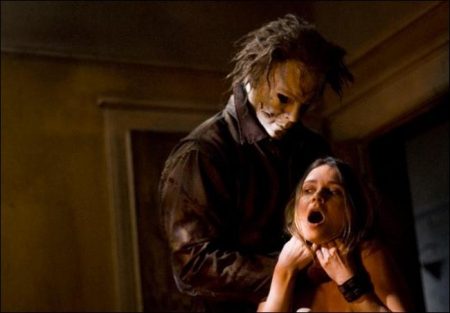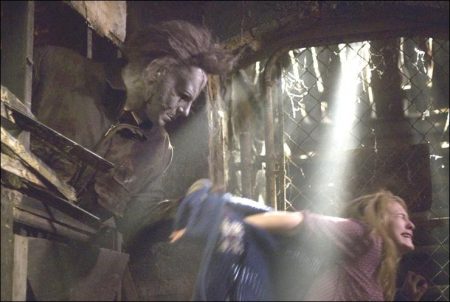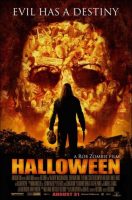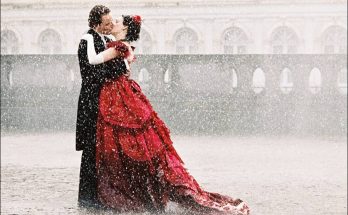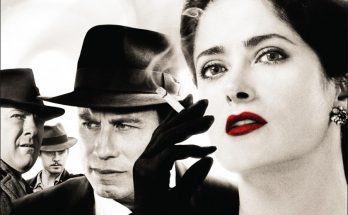Tagline: Evil has a destiny.
The residents of Haddonfield don’t know it yet… but death is coming to their small sleepy town. Sixteen years ago, a ten year old boy called Michael Myers brutally kills his step father, his elder sister and her boyfriend. Sixteen years later, he escapes from the mental institution and makes his way back to his hometown intent on a murderous rampage pursued by Dr Sam Loomis who is Michael’s doctor and the only one who knows Michael’s true evil. Elsewhere a shy teenager by the name of Laurie Strode is babysitting on the night Michael comes home… is it pure coincidence that she and her friends are being stalked by him?
Halloween is a 2007 American slasher film written, directed, and produced by Rob Zombie. The film is a remake/reimagining of the 1978 horror film of the same name; the first in the rebooted Halloween film series and the ninth installment of the Halloween franchise. The film stars Tyler Mane as the adult Michael Myers, Malcolm McDowell as Dr. Sam Loomis, and Scout Taylor-Compton as Laurie Strode; Daeg Faerch portrays a ten-year-old Michael Myers. Rob Zombie’s “reimagining” follows the premise of John Carpenter’s original, with Michael Myers stalking Laurie Strode and her friends on Halloween night. Zombie’s film goes deeper into the character’s psyche, trying to answer the question of what drove him to kill people, whereas in Carpenter’s original film Michael did not have an explicit reason for killing.
On its opening day, Halloween grossed $10,896,610, and immediately surpassed the opening weekend grosses for Halloween II (1981) at $7,446,508, Season of the Witch (1982) at $6,333,259, The Return of Michael Myers (1988) at $6,831,250, The Revenge of Michael Myers (1989) at $5,093,428, and The Curse of Michael Myers (1995) at $7,308,529. From September 1–2, Halloween earned $8,554,661 and $6,911,096, respectively, for a 3-day opening weekend total of $26,362,367.
The film would earn an additional $4,229,392 on Labor Day for a 4-day holiday weekend gross of $30,591,759, making it the highest ever for that holiday. As a result, the 2007 film would immediately surpass the total box office gross for Halloween II (1981) at $25,533,818, Halloween III (1982) at $14,400,000, Halloween 4 (1988) at $17,768,757, Halloween 5 (1989) at $11,642,254, The Curse of Michael Myers (1995) at $15,116,634, and Halloween: Resurrection (2002) with $30,354,442.
Production Information
With “Halloween,” writer / director Rob Zombie, acclaimed musician and visionary director of “The Devil’s Rejects” and “House of 1000 Corpses,” re-imagines one of the most iconic films in the annals of horror, director John Carpenter’s 1978 classic, “Halloween,” featuring the ruthless, masked killing machine Michael Myers.
Inspired by Carpenter’s 1978 original and his theme that “evil can appear in even the smallest of towns,” Rob Zombie “Halloween” focuses on the early years of young Michael Myers and the events leading up to his fateful Halloween night murder rampage in the quiet town of Haddonfield, Illinois.
Following that brutal night, Michael begins 17 years of incarceration at the Smith’s Grove Sanitarium maximum-security mental facility where he is treated by noted child behaviorist Dr. Samuel Loomis – the only person who can truly understand Michael’s evil nature. Now, 17 years later, Michael escapes from the mental facility on Halloween day and begins a murderous trek back to Haddonfield to continue his killing streak and seek resolution to events from his past.
In Haddonfield, Michael begins stalking a high school girl, Laurie Strode, and her friends, Annie and Lynda. When Dr. Loomis, now a successful author for his book on Michael, hears of his escape, he enlists the help of Haddonfield’s Sheriff Brackett to find and put an end to Michael’s reign of terror.
The original “Halloween,” directed by legendary horror master John Carpenter and released on October 25, 1978, went on to gross $55 million in worldwide box office. It was the beginning of what would become one of the most successful, enduring, and influential horror franchises in film history, spawning eight films over 25 years and creating a legacy that would be duplicated in countless horror films to follow.
About the Production
For Akkad, “Halloween” is literally the family business, as he spent his formative years on the set of the earlier films starting with “Halloween 4.” Akkad’s late father, Moustapha Akkad, financed John Carpenter’s 1978 original, and his company, Trancas International Films, owns the “Halloweens” franchise internationally and produced all of its subsequent sequels. “In a way it’s a family legacy that I’m carrying on,” Akkad shares. “We’re all really excited about this one and we’re really thrilled to have Rob Zombie. He just brings a whole new fresh air of excitement for both fans of the original and for all the new fans as we cross over into new areas.”
Producer Andy Gould, Rob Zombie’s longtime manager, also produced Zombie’s previous films, “House of 1000 Corpses” and “The Devil’s Rejects.” Gould recalls that the gestation for Zombie’s involvement in “Halloween” came soon after the successful release of “The Devil’s Rejects.” “We’d taken some time off to go make an album and tour,” Gould says. “And around that time we got a phone call from Bob Weinstein who said they really liked what Rob was doing. They liked his vision and ‘The Devil’s Rejects’ and wanted to know if he would be interested in coming in and making a movie for them.”
Gould recalls that at the meeting they were asked if they ever thought of doing “Halloween.” “At first blush, no was really the answer,” Gould continues. “Because it’s a classic and for the most part remakes are not very good. So we were very reluctant. But then Rob came around to thinking that perhaps there was another point of view, another story that could be told that wasn’t a shot for shot remake.”
By remaking “Halloween,” a horror classic so near and dear to so many fans’ hearts, Rob Zombie knew that eyes of the world would be upon him. Andy Gould relates that Rob knew he’d be treading on sacred ground, and didn’t do it lightly.
At first, Zombie acknowledges that he had no interest in doing the film, as he was not a fan of remakes, especially in the horror genre. “They hadn’t really worked out so well,” he imparts. “Especially with movies that I thought were good the first time. I didn’t see point. And then I started thinking about movies that I did like that were remakes, like ‘Scarface’ or ‘Cape Fear.’ I realized we’d still be watching the silent version of ‘Dracula’ had it not been remade. So I started to think along those lines.”
Zombie set out to write a film that would incorporate Carpenter’s original elements, but that would also expand upon the back. “In the original they keep telling you things happen, but you never see them,” Zombie explains. “So I thought I could go in there and show all that stuff and expand upon it. It’s a good story and it’s really simple, and I thought there was a lot of places you could go with it.”
“Seeing that the first ‘Halloween’ came out thirty years ago, the audiences today are much more sophisticated; they expect more. The first one is a classic for many reasons, one being that you barely see a drop of blood in the entire thing. But today’s audiences expect more.”
Having seen Zombie’s previous two films, Akkad felt they were emblematic of the new genre of horror and that he brought cutting edge style that could work really well for “Halloween.” “Rob wrote a terrific script,” Akkad states. “When he came in and pitched us he had a full fleshed out concept of how you can keep the core elements of the original and then add these fresh new elements that we hadn’t seen before. So it’s really a reinventing, or re-imagining of the franchise.”
“I suppose one might use ‘Batman Begins’ as an example of how you can retell a story,” says Andy Gould. “You’re getting some of the back story and you’re filling in some of the gaps. Because if you look at the original ‘Halloween,” it starts with the little boy and the early murders. In this there’s more of the how and why of the story.” Gould notes that there is certainly an homage to the original movie in certain scenes, but it’s definitely Rob Zombie’s vision.”
“After working with Rob, the really surprising thing is how much he gives to the project,” Akkad adds. “He gives two hundred percent with the actors, with every department. There’s no doubt this is a Rob Zombie film; he’s left his mark on every aspect of it.”
With his core filmmaking team in place, Zombie and the producers set out to find new cast members to portray the well-known, beloved characters familiar to 30 years of filmgoers. This process created numerous challenges, such as whether to go with well-known actors, character actors, or newcomers. In the end, the filmmakers mixed it up, combining them all to create the vision that Zombie had imagined.
Although there are many new elements to the movie, notably in the young Michael Myers storyline, when it came to Michael’s life as an adult the filmmakers didn’t tinker too much with the characters that had already been established. “There are characters and classic moments that we had to keep, because if we went too far away from those elements then it wouldn’t be ‘Halloween,’ notes Akkad. “We kept the character names mostly the same. There are some lines that Doctor Loomis and the girl’s say that are always trademark. Those elements tie it to the original, and yet it’s done in a way, both with the acting and the editing, that are completely new and fresh.”
“Halloween” centers on three stages of Michael Myers life: his early years when he’s as a ten year old in Haddonfield, his years under the watchful eye of Dr. Loomis at the Sanitarium, and the fateful day following his escape.
“We definitely get deeper into Michael’s youth and his childhood, and his time in the institution,” Akkad reveals. “So it sort of fills in all these gaps. The original one really didn’t touch on any of that, which in a way was good for the time because it let people fill in the blanks for themselves. But now we’re going back and getting a little more detailed into Michael’s family history. I think that will make it very fresh for the die hard fans, but it’ll also make it more of a complete rounded out story for audiences today who expect more than just the guy chasing and killing babysitters. Michael Myers is now a much more fully fleshed out character.
Rob Zombie gives some insight into what makes Michael Myers tick. “I did a lot of research because I wanted the movie to play real, because it becomes so uncomfortable to watch something that feels real,” he says. “We decided to play Michael like a true psychopath. It doesn’t mean that he’s not charming. That’s why I made him kind of a friendly happy little kid because some of my research reinforced that someone who’s a psychopath could be charismatic, they could be charming, they could be friendly. They just have no sense of right or wrong. No sense of remorse. No sense of anything. They just don’t have those emotions. That’s sort of how I play it.”
Early on, signs begin to emerge in young Michael’s life that he is not the most normal kid in school. This is notably played out when the school’s Principal Chambers makes a gruesome discovery in Michael’s backpack and calls on a child psychologist to weigh in.
That child psychologist, Dr. Samuel Loomis, is played by Oscar winning veteran actor, Malcolm McDowell, star of Stanley Kubrick’s classic “A Clockwork Orange,” as well as dozens of films, and most recently television series such as “Heroes” and “Entourage.”
“Casting is one of Rob’s great talents,” Gould imparts. “His view of who can play these characters always amazes. In the early part of the process he’ll call and go, ‘I’ve got this great idea, you know, Dr. Loomis — Malcolm McDowell. And of course that’s great. Perfect.’”
As widely known to his fans and reported, “A Clockwork Orange” is Rob Zombie’s favorite film, so selecting McDowell to fill the big shoes of the role made famous by Donald Pleasance was both an easy decision and an honor. “Malcolm was somebody I knew from day one I wanted for Dr. Loomis,” Zombie says. “The way I wanted to play Dr. Loomis was sort of different and I knew I needed an actor that could balance the quality where he’s not even really a likeable character – he’s kind of egotistical and annoying – but he’s charismatic. And I knew Malcolm could bring that quality to it. So you like him even if you’re not sure you should.”
McDowell acknowledges that he was very skeptical about doing a horror film at this point in his career, but when he met Rob Zombie he had a change of heart. “It was obvious that the man was extremely intelligent and had a wonderful take on the subject,” McDowell states. “He wanted to make something new and fresh and really a classic horror film. And the genre is so exciting in its classical form that he didn’t really have to work hard to sell me.”
The depth of the characters in the film also impressed McDowell. “I like something that’s driven by character,” he explains. “I think that’s the reason why this film works. It doesn’t rely on special effects. It relies on development of character and whether you believe these people. If you make the characters threedimensional and you care about them, even the small characters, the smaller parts, then you don’t need special effects. I think that’s our strength.”
McDowell did not want to repeat the performance of his old friend and colleague, Donald Pleasance. “I certainly didn’t want to do a pale imitation of Donald Pleasance, so I talked it over with Rob and we agreed that it would be much more fun if this character could bring a lighter side,” he says. “I don’t mean to say that he’s a comedic character, he’s not. But he’s a little pompous. He’s a doctor and a bit of an egotist. He thinks he’s the greatest in his field. The thing that I latched onto was that fact that Loomis got a lot of mileage out of this patient. He’d written a best selling book and is a pundit on TV. So if you have a sort of lighter side with the doctor, then the scary moments become a lot scarier.” With Dr. Loomis’ role in the film spanning 17 years, the makeup and hair department also had to change McDowell’s age appearance his look for the two separate timelines.
Halloween (2007)
Directed by: Rob Zombie
Oyuncular Malcolm McDowell, Brad Dourif, Tyler Mane, Daeg Faerch, Sheri Moon, William Forsythe, Richard Lynch, Udo Kier, Scout Taylor-Compton, Ken Foree
Screenplay by: Rob Zombie, John Carpenter
Production Design by: Anthony Tremblay
Cinematography by: Phil Parmet
Film Editing by: Glenn Garland
Costume Design by: Mary E. McLeod
Music: Tyler Bates
MPAA Rating: R for strong brutal bloody violence and terror throughout, sexual content, graphic nudity and language.
Distributed by: Metro Goldwyn Mayer, Dimension Films
Release Date: August 31, 2007
Visits: 108
